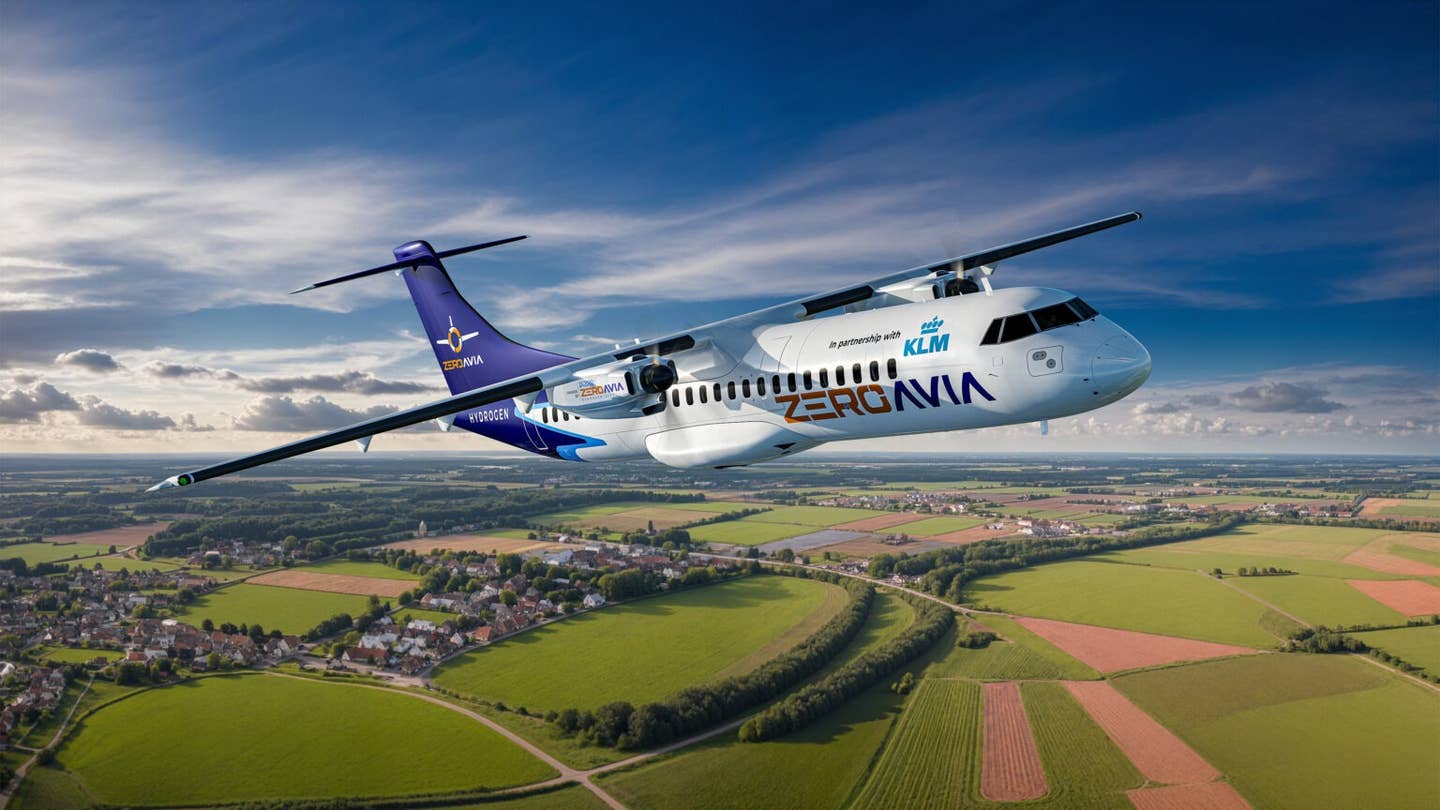Lilium, Lufthansa Working on Strategic Partnership for European Air Taxis
Lufthansa, one of Europe’s largest airlines, previously launched an initiative aimed at slashing its carbon emissions in half by 2030.

A prototype of Lilium’s flagship, seven-seat Lilium Jet soars over the Spanish countryside during flight testing. [Courtesy: Lilium]
Within hours of the announcement that its flagship aircraft is ready for production, German electric vertical takeoff and landing (eVTOL) air taxi manufacturer Lilium secured an agreement with one of Europe’s largest airlines.
The company on Thursday announced that it had signed a memorandum of understanding (MOU) with Lufthansa, Germany’s flag carrier, to explore a potential strategic partnership that would bring eVTOL aircraft to Europe. Combined with its subsidiaries, Lufthansa is one of the largest European airlines by passengers carried—and by some estimates the top dog.
The German airline’s fleet comprises more than 700 commercial aircraft. But as part of a strategy to reduce fleet emissions and improve cost-efficiency, the company has been snapping up new aircraft—such as the Airbus A350-900 or Boeing 777-9—that it says deliver 30 percent lower carbon emissions and fuel consumption than predecessors.
Now, zero-emissions aircraft are in its crosshairs. The airline hopes to slash carbon emissions in half by 2030 and become completely carbon-neutral by 2050.
“Innovation is part of our DNA,” said Dr. Detlef Kayser, a member of Lufthansa’s executive board who oversees fleet and technology. “The Lufthansa Group aspires to be a global leader in the integration of state-of-the-art products and processes. We want to develop aviation further and drive the transformation of the industry… Only with innovation, courage and determination can we, as an industry, make aviation more sustainable and master the challenges of the future.”
Lilium and Lufthansa want to examine ways the European aviation industry can innovate in areas such as ground and flight operations, aircraft maintenance, crewing, and flight training, the companies said. Should the manufacturer and the airline enter into a strategic partnership, as has been proposed, the two also want to loop in third parties, such as airports and regional partners.
Those collaborations could lead to the development of crucial advanced air mobility (AAM) infrastructure: vertiports, electric aircraft chargers, and the like. The firms also intend to work with third parties to tackle airspace integration and define clear operational processes—if the partnership comes to fruition.
“The Lufthansa Group has been at the forefront of some of Europe’s most important aviation initiatives, especially in the area of environmental sustainability,” said Klaus Roewe, CEO of Lilium. “We are thrilled to explore opportunities on bringing eVTOL flights to Lufthansa Group customers.”
Lilium on Wednesday announced it began building the inaugural model of its flagship Lilium Jet, a seven-seat eVTOL air taxi designed for 25 to 125 sm (22 to 109 nm) trips between towns and inner cities.
According to the company’s internal projections, the European market is expected to demand around 9,200 eVTOLs through 2035. The manufacturer will compete with German air taxi rival Volocopter, and several other firms targeting European operations, to eat up market share.
To do so, it will first need to certify the Jet with the European Union Aviation Safety Agency (EASA). Lilium expects to conduct crewed flights with the regulator next year, and the campaign aims to culminate in type certification in 2025.
Last month, the firm notched another key milestone in that process by obtaining EASA design organization approval (DOA). The approval is essentially Lilium’s License to Operate: It grants the manufacturer authority to design and type certify the Jet for safe operations under the agency’s special condition for VTOL (SC-VTOL) rules. DOA is a rigorous process—and a requirement for type certification of EASA Part 21 commercial aircraft.
Simultaneously, Lilium is working to certify the Jet in the U.S. The manufacturer is the first and only eVTOL air taxi company with certification bases from both EASA and the FAA, setting it up for commercial launches in both markets in a few years. South Florida could be the firm’s U.S. launch market.
Lufthansa isn’t the only flag carrier Lilium has agreed to work with. Saudia, the national airline of Saudi Arabia, intends to purchase 100 Jets to build a nationwide eVTOL network.
The company’s largest agreement is with Brazil’s Azul: a billion-dollar commercial deal for the purchase of 220 aircraft. It’s also working with Chinese GA transport and helicopter services company Heli-Eastern to bring 100 Jets to the Guangdong-Hong Kong-Macau Greater Bay Area.
Like this story? We think you'll also like the Future of FLYING newsletter sent every Thursday afternoon. Sign up now.

Subscribe to Our Newsletter
Get the latest FLYING stories delivered directly to your inbox






